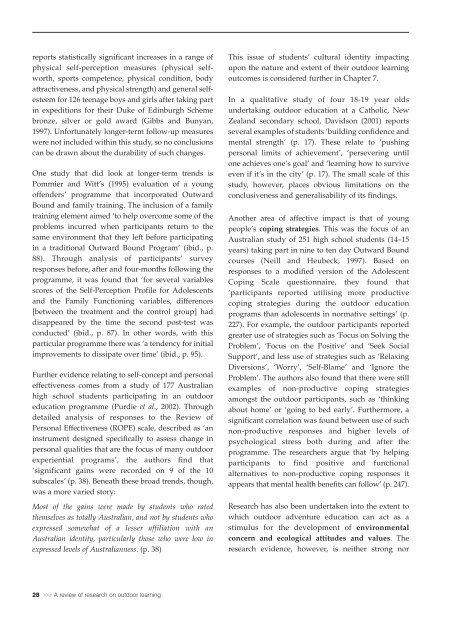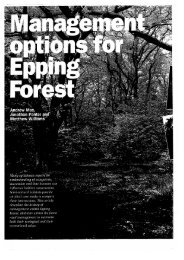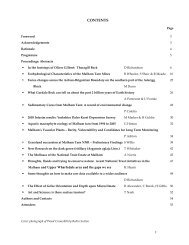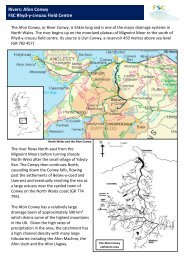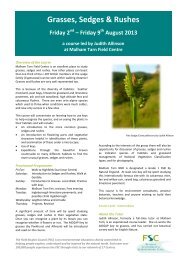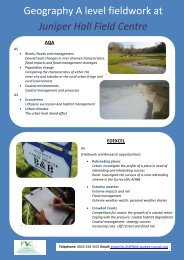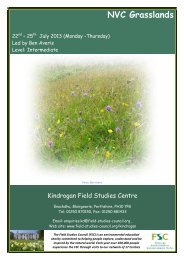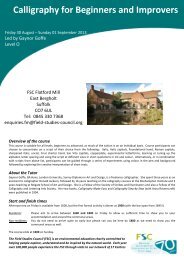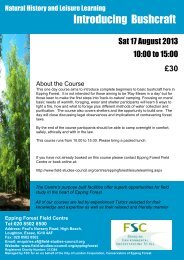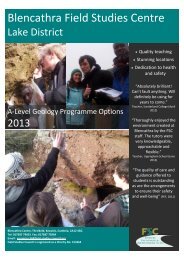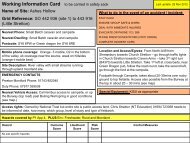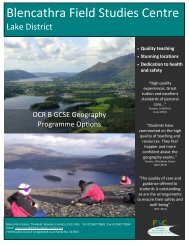A review of research on outdoor learning - Field Studies Council
A review of research on outdoor learning - Field Studies Council
A review of research on outdoor learning - Field Studies Council
- No tags were found...
You also want an ePaper? Increase the reach of your titles
YUMPU automatically turns print PDFs into web optimized ePapers that Google loves.
eports statistically significant increases in a range <str<strong>on</strong>g>of</str<strong>on</strong>g>physical self-percepti<strong>on</strong> measures (physical selfworth,sports competence, physical c<strong>on</strong>diti<strong>on</strong>, bodyattractiveness, and physical strength) and general selfesteemfor 126 teenage boys and girls after taking partin expediti<strong>on</strong>s for their Duke <str<strong>on</strong>g>of</str<strong>on</strong>g> Edinburgh Schemebr<strong>on</strong>ze, silver or gold award (Gibbs and Bunyan,1997). Unfortunately l<strong>on</strong>ger-term follow-up measureswere not included within this study, so no c<strong>on</strong>clusi<strong>on</strong>scan be drawn about the durability <str<strong>on</strong>g>of</str<strong>on</strong>g> such changes.One study that did look at l<strong>on</strong>ger-term trends isPommier and Witt’s (1995) evaluati<strong>on</strong> <str<strong>on</strong>g>of</str<strong>on</strong>g> a young<str<strong>on</strong>g>of</str<strong>on</strong>g>fenders’ programme that incorporated OutwardBound and family training. The inclusi<strong>on</strong> <str<strong>on</strong>g>of</str<strong>on</strong>g> a familytraining element aimed ‘to help overcome some <str<strong>on</strong>g>of</str<strong>on</strong>g> theproblems incurred when participants return to thesame envir<strong>on</strong>ment that they left before participatingin a traditi<strong>on</strong>al Outward Bound Program’ (ibid., p.88). Through analysis <str<strong>on</strong>g>of</str<strong>on</strong>g> participants’ surveyresp<strong>on</strong>ses before, after and four-m<strong>on</strong>ths following theprogramme, it was found that ‘for several variablesscores <str<strong>on</strong>g>of</str<strong>on</strong>g> the Self-Percepti<strong>on</strong> Pr<str<strong>on</strong>g>of</str<strong>on</strong>g>ile for Adolescentsand the Family Functi<strong>on</strong>ing variables, differences[between the treatment and the c<strong>on</strong>trol group] haddisappeared by the time the sec<strong>on</strong>d post-test wasc<strong>on</strong>ducted’ (ibid., p. 87). In other words, with thisparticular programme there was ‘a tendency for initialimprovements to dissipate over time’ (ibid., p. 95).Further evidence relating to self-c<strong>on</strong>cept and pers<strong>on</strong>aleffectiveness comes from a study <str<strong>on</strong>g>of</str<strong>on</strong>g> 177 Australianhigh school students participating in an <strong>outdoor</strong>educati<strong>on</strong> programme (Purdie et al., 2002). Throughdetailed analysis <str<strong>on</strong>g>of</str<strong>on</strong>g> resp<strong>on</strong>ses to the Review <str<strong>on</strong>g>of</str<strong>on</strong>g>Pers<strong>on</strong>al Effectiveness (ROPE) scale, described as ‘aninstrument designed specifically to assess change inpers<strong>on</strong>al qualities that are the focus <str<strong>on</strong>g>of</str<strong>on</strong>g> many <strong>outdoor</strong>experiential programs’, the authors find that‘significant gains were recorded <strong>on</strong> 9 <str<strong>on</strong>g>of</str<strong>on</strong>g> the 10subscales’ (p. 38). Beneath these broad trends, though,was a more varied story:Most <str<strong>on</strong>g>of</str<strong>on</strong>g> the gains were made by students who ratedthemselves as totally Australian, and not by students whoexpressed somewhat <str<strong>on</strong>g>of</str<strong>on</strong>g> a lesser affiliati<strong>on</strong> with anAustralian identity, particularly those who were low inexpressed levels <str<strong>on</strong>g>of</str<strong>on</strong>g> Australianness. (p. 38)This issue <str<strong>on</strong>g>of</str<strong>on</strong>g> students’ cultural identity impactingup<strong>on</strong> the nature and extent <str<strong>on</strong>g>of</str<strong>on</strong>g> their <strong>outdoor</strong> <strong>learning</strong>outcomes is c<strong>on</strong>sidered further in Chapter 7.In a qualitative study <str<strong>on</strong>g>of</str<strong>on</strong>g> four 18-19 year oldsundertaking <strong>outdoor</strong> educati<strong>on</strong> at a Catholic, NewZealand sec<strong>on</strong>dary school, Davids<strong>on</strong> (2001) reportsseveral examples <str<strong>on</strong>g>of</str<strong>on</strong>g> students ‘building c<strong>on</strong>fidence andmental strength’ (p. 17). These relate to ‘pushingpers<strong>on</strong>al limits <str<strong>on</strong>g>of</str<strong>on</strong>g> achievement’, ‘persevering until<strong>on</strong>e achieves <strong>on</strong>e’s goal’ and ‘<strong>learning</strong> how to surviveeven if it’s in the city’ (p. 17). The small scale <str<strong>on</strong>g>of</str<strong>on</strong>g> thisstudy, however, places obvious limitati<strong>on</strong>s <strong>on</strong> thec<strong>on</strong>clusiveness and generalisability <str<strong>on</strong>g>of</str<strong>on</strong>g> its findings.Another area <str<strong>on</strong>g>of</str<strong>on</strong>g> affective impact is that <str<strong>on</strong>g>of</str<strong>on</strong>g> youngpeople’s coping strategies. This was the focus <str<strong>on</strong>g>of</str<strong>on</strong>g> anAustralian study <str<strong>on</strong>g>of</str<strong>on</strong>g> 251 high school students (14–15years) taking part in nine to ten day Outward Boundcourses (Neill and Heubeck, 1997). Based <strong>on</strong>resp<strong>on</strong>ses to a modified versi<strong>on</strong> <str<strong>on</strong>g>of</str<strong>on</strong>g> the AdolescentCoping Scale questi<strong>on</strong>naire, they found that‘participants reported utilising more productivecoping strategies during the <strong>outdoor</strong> educati<strong>on</strong>programs than adolescents in normative settings’ (p.227). For example, the <strong>outdoor</strong> participants reportedgreater use <str<strong>on</strong>g>of</str<strong>on</strong>g> strategies such as ‘Focus <strong>on</strong> Solving theProblem’, ‘Focus <strong>on</strong> the Positive’ and ‘Seek SocialSupport’, and less use <str<strong>on</strong>g>of</str<strong>on</strong>g> strategies such as ‘RelaxingDiversi<strong>on</strong>s’, ‘Worry’, ‘Self-Blame’ and ‘Ignore theProblem’. The authors also found that there were stillexamples <str<strong>on</strong>g>of</str<strong>on</strong>g> n<strong>on</strong>-productive coping strategiesam<strong>on</strong>gst the <strong>outdoor</strong> participants, such as ‘thinkingabout home’ or ‘going to bed early’. Furthermore, asignificant correlati<strong>on</strong> was found between use <str<strong>on</strong>g>of</str<strong>on</strong>g> suchn<strong>on</strong>-productive resp<strong>on</strong>ses and higher levels <str<strong>on</strong>g>of</str<strong>on</strong>g>psychological stress both during and after theprogramme. The <str<strong>on</strong>g>research</str<strong>on</strong>g>ers argue that ‘by helpingparticipants to find positive and functi<strong>on</strong>alalternatives to n<strong>on</strong>-productive coping resp<strong>on</strong>ses itappears that mental health benefits can follow’ (p. 247).Research has also been undertaken into the extent towhich <strong>outdoor</strong> adventure educati<strong>on</strong> can act as astimulus for the development <str<strong>on</strong>g>of</str<strong>on</strong>g> envir<strong>on</strong>mentalc<strong>on</strong>cern and ecological attitudes and values. The<str<strong>on</strong>g>research</str<strong>on</strong>g> evidence, however, is neither str<strong>on</strong>g nor28 >>> A <str<strong>on</strong>g>review</str<strong>on</strong>g> <str<strong>on</strong>g>of</str<strong>on</strong>g> <str<strong>on</strong>g>research</str<strong>on</strong>g> <strong>on</strong> <strong>outdoor</strong> <strong>learning</strong>


